 Pro-Russia militants, armed with baseball bats and iron bars, hold flares as they attack people marching for national unity in Donetsk, Ukraine, on Monday, April 28. Ukraine has seen a sharp rise in tensions since a new pro-European government took charge of the country in February. Moscow branded the new government illegitimate and annexed Ukraine's Crimea region last month, citing threats to Crimea's Russian-speaking majority. And in eastern Ukraine, pro-Russian separatists have captured towns and government buildings and are holding a team of European monitors hostage.
Pro-Russia militants, armed with baseball bats and iron bars, hold flares as they attack people marching for national unity in Donetsk, Ukraine, on Monday, April 28. Ukraine has seen a sharp rise in tensions since a new pro-European government took charge of the country in February. Moscow branded the new government illegitimate and annexed Ukraine's Crimea region last month, citing threats to Crimea's Russian-speaking majority. And in eastern Ukraine, pro-Russian separatists have captured towns and government buildings and are holding a team of European monitors hostage.  Detained observers from the Organization for Security and Co-operation in Europe arrive to take part in a news conference Sunday, April 27, in the eastern Ukrainian city of Slavyansk. Vyacheslav Ponomarev, the self-declared mayor of Slavyansk, referred to the observers as "prisoners of war."
Detained observers from the Organization for Security and Co-operation in Europe arrive to take part in a news conference Sunday, April 27, in the eastern Ukrainian city of Slavyansk. Vyacheslav Ponomarev, the self-declared mayor of Slavyansk, referred to the observers as "prisoners of war."  Ukrainian troops stand guard behind a barricade made of sandbags at a checkpoint about 30 kilometers (20 miles) from Slavyansk on April 27.
Ukrainian troops stand guard behind a barricade made of sandbags at a checkpoint about 30 kilometers (20 miles) from Slavyansk on April 27.  Relatives and friends of a man killed in a gunfight participate in his funeral ceremony in Slavyansk on Saturday, April 26.
Relatives and friends of a man killed in a gunfight participate in his funeral ceremony in Slavyansk on Saturday, April 26.  U.S. troops arrive at an air force base near Siauliai Zuokniai, Lithuania, on April 26. The United States is conducting military exercises in Poland, Latvia, Estonia and Lithuania. The exercises are, in part, a response to the ongoing instability in Ukraine.
U.S. troops arrive at an air force base near Siauliai Zuokniai, Lithuania, on April 26. The United States is conducting military exercises in Poland, Latvia, Estonia and Lithuania. The exercises are, in part, a response to the ongoing instability in Ukraine.  Ukrainian government troops in armored vehicles travel on a country road outside the town of Svyitohirsk in eastern Ukraine on April 26.
Ukrainian government troops in armored vehicles travel on a country road outside the town of Svyitohirsk in eastern Ukraine on April 26. 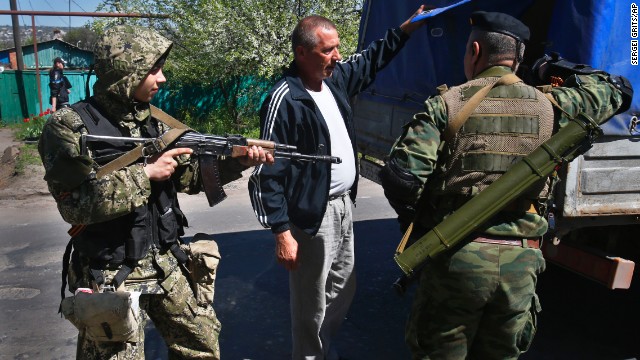 Pro-Russia armed militants inspect a truck near Slavyansk on Friday, April 25. Russian Foreign Minister Sergey Lavrov has accused the West of plotting to control Ukraine, and he said the pro-Russia insurgents in the southeast would lay down their arms only if the Ukrainian government clears out the Maidan protest camp in the capital, Kiev.
Pro-Russia armed militants inspect a truck near Slavyansk on Friday, April 25. Russian Foreign Minister Sergey Lavrov has accused the West of plotting to control Ukraine, and he said the pro-Russia insurgents in the southeast would lay down their arms only if the Ukrainian government clears out the Maidan protest camp in the capital, Kiev.  Pro-Russia militants keep records of their duty in Slavyansk on April 25.
Pro-Russia militants keep records of their duty in Slavyansk on April 25.  Ukrainian troops take position near burning tires at a pro-Russian checkpoint in Slavyansk on Thursday, April 24.
Ukrainian troops take position near burning tires at a pro-Russian checkpoint in Slavyansk on Thursday, April 24.  Ukrainian special forces take position at an abandoned roadblock in Slavyansk on April 24.
Ukrainian special forces take position at an abandoned roadblock in Slavyansk on April 24. 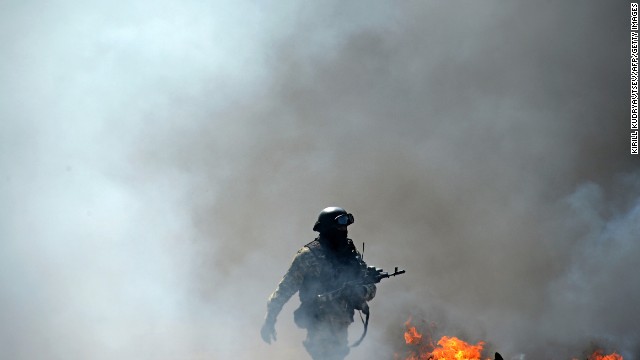 A Ukrainian special forces member takes position in Slavyansk.
A Ukrainian special forces member takes position in Slavyansk. 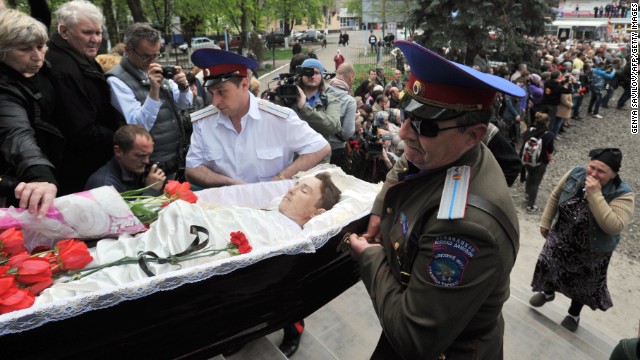 Cossacks carry a coffin into a church in Slavyansk on Tuesday, April 22, during a funeral for men killed in a gunfight at a checkpoint two days before.
Cossacks carry a coffin into a church in Slavyansk on Tuesday, April 22, during a funeral for men killed in a gunfight at a checkpoint two days before.  U.S. Vice President Joe Biden, left, talks with Ukrainian Prime Minister Arseniy Yatsenyuk during a meeting in Kiev on April 22.
U.S. Vice President Joe Biden, left, talks with Ukrainian Prime Minister Arseniy Yatsenyuk during a meeting in Kiev on April 22.  An armed pro-Russian man stands on a street in Slavyansk on Monday, April 21.
An armed pro-Russian man stands on a street in Slavyansk on Monday, April 21.  Demonstrators attend a pro-Russian rally outside the secret service building in Lugansk, Ukraine, on April 21.
Demonstrators attend a pro-Russian rally outside the secret service building in Lugansk, Ukraine, on April 21. 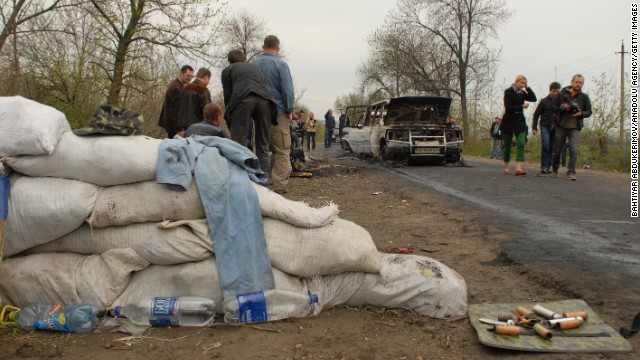 Cars are burned out after an attack at a roadblock in Slavyansk on Sunday, April 20.
Cars are burned out after an attack at a roadblock in Slavyansk on Sunday, April 20.  A resident inspects burnt-out cars at a roadblock on April 20.
A resident inspects burnt-out cars at a roadblock on April 20.  A pro-Russian militant is seen at the roadblock near Slavyansk on April 20.
A pro-Russian militant is seen at the roadblock near Slavyansk on April 20.  Armed pro-Russian militants stand guard at a roadblock near Slavyansk on April 20.
Armed pro-Russian militants stand guard at a roadblock near Slavyansk on April 20. 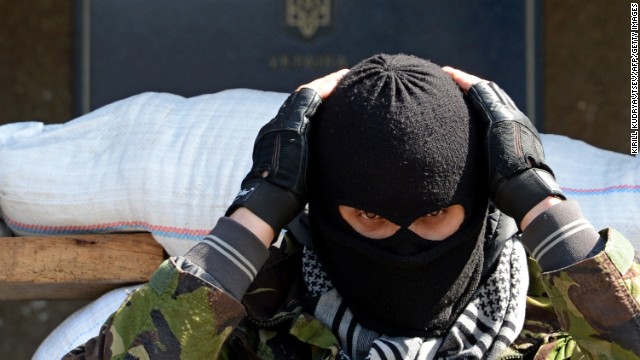 A masked man stands guard outside a regional administration building seized by pro-Russian separatists in Slavyansk on Friday, April 18.
A masked man stands guard outside a regional administration building seized by pro-Russian separatists in Slavyansk on Friday, April 18. 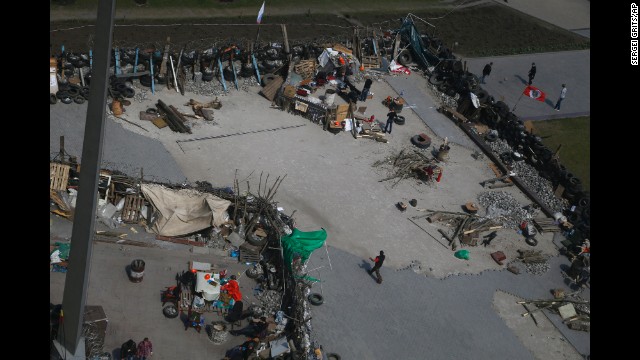 People walk around barricades April 18 set up at the regional administration building that was seized earlier in Donetsk.
People walk around barricades April 18 set up at the regional administration building that was seized earlier in Donetsk. 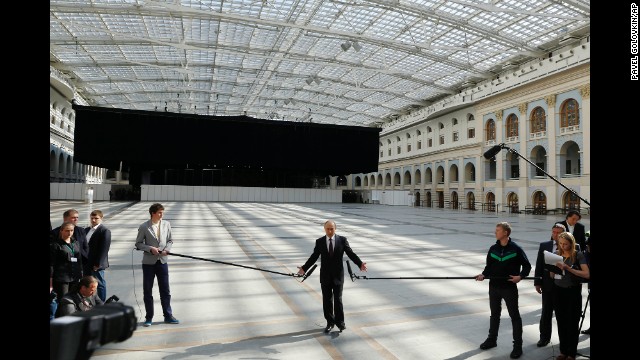 Russian President Vladimir Putin speaks to the media after a nationally televised question-and-answer session in Moscow on Thursday, April 17. Putin denied that Russian forces are involved in the unrest in eastern Ukraine, though he did say for the first time that Russians were active in Crimea before the peninsula voted to join the country.
Russian President Vladimir Putin speaks to the media after a nationally televised question-and-answer session in Moscow on Thursday, April 17. Putin denied that Russian forces are involved in the unrest in eastern Ukraine, though he did say for the first time that Russians were active in Crimea before the peninsula voted to join the country.  Ukrainian riot police officers stand guard during a pro-Ukrainian demonstration in Donetsk on April 17.
Ukrainian riot police officers stand guard during a pro-Ukrainian demonstration in Donetsk on April 17.  Masked pro-Russian protesters stand guard in front of the city hall in Mariupol, Ukraine, on April 17.
Masked pro-Russian protesters stand guard in front of the city hall in Mariupol, Ukraine, on April 17.  U.S. Secretary of State John Kerry reaches out to shake hands with Russian Foreign Minister Sergey Lavrov at the start of a bilateral meeting to discuss the ongoing situation in Ukraine. The meeting took place April 17 in Geneva, Switzerland.
U.S. Secretary of State John Kerry reaches out to shake hands with Russian Foreign Minister Sergey Lavrov at the start of a bilateral meeting to discuss the ongoing situation in Ukraine. The meeting took place April 17 in Geneva, Switzerland.  A masked gunman stands guard near tanks in Slavyansk on Wednesday, April 16.
A masked gunman stands guard near tanks in Slavyansk on Wednesday, April 16.  A Ukrainian helicopter flies over a column of Ukrainian Army combat vehicles on the way to Kramatorsk, a city in eastern Ukraine, on April 16.
A Ukrainian helicopter flies over a column of Ukrainian Army combat vehicles on the way to Kramatorsk, a city in eastern Ukraine, on April 16.  A masked pro-Russian gunman guards combat vehicles parked in downtown Slavyansk on April 16.
A masked pro-Russian gunman guards combat vehicles parked in downtown Slavyansk on April 16.  A man talks with Ukrainian soldiers as they are blocked by people on their way to Kramatorsk.
A man talks with Ukrainian soldiers as they are blocked by people on their way to Kramatorsk. 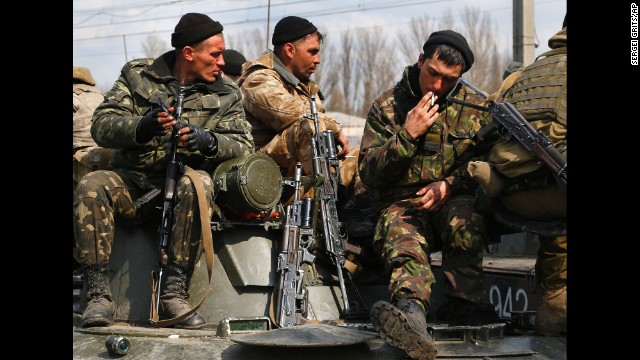 Ukrainian soldiers sit atop combat vehicles on their way to Kramatorsk.
Ukrainian soldiers sit atop combat vehicles on their way to Kramatorsk.  Ukrainian Gen. Vasily Krutov is surrounded by protesters after addressing the crowd outside an airfield in Kramatorsk on Tuesday, April 15.
Ukrainian Gen. Vasily Krutov is surrounded by protesters after addressing the crowd outside an airfield in Kramatorsk on Tuesday, April 15.  Pro-Russian activists guard a barricade April 15 outside the regional police building that they seized in Slavyansk.
Pro-Russian activists guard a barricade April 15 outside the regional police building that they seized in Slavyansk.  Ukrainian troops receive munitions at a field on the outskirts of Izium, Ukraine, on April 15.
Ukrainian troops receive munitions at a field on the outskirts of Izium, Ukraine, on April 15.  Armed pro-Russian activists stand guard on top of a Ukrainian regional administration building in Slavyansk on Monday, April 14.
Armed pro-Russian activists stand guard on top of a Ukrainian regional administration building in Slavyansk on Monday, April 14.  A pro-Russian activist carries a shield during the mass storming of a police station in Horlivka, Ukraine, on April 14.
A pro-Russian activist carries a shield during the mass storming of a police station in Horlivka, Ukraine, on April 14.  Russian supporters attend a rally in front of the security service building occupied by pro-Russian activists in Luhansk, Ukraine, on April 14.
Russian supporters attend a rally in front of the security service building occupied by pro-Russian activists in Luhansk, Ukraine, on April 14. 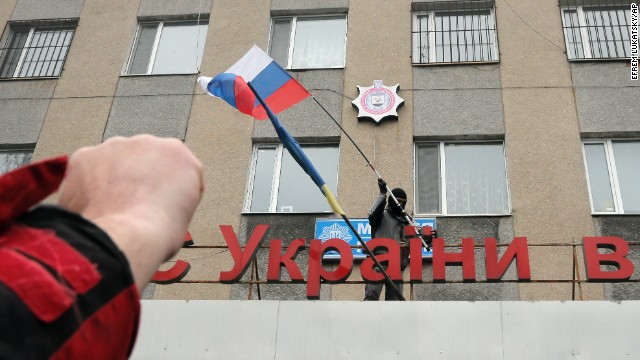 A man places a Russian flag over a police station after storming the building in Horlivka on April 14.
A man places a Russian flag over a police station after storming the building in Horlivka on April 14.  Men besiege the police station in Horlivka.
Men besiege the police station in Horlivka.  The Horlivka police station burns on April 14.
The Horlivka police station burns on April 14.  A Ukrainian police officer receives medical care after being attacked at the police station in Horlivka on April 14.
A Ukrainian police officer receives medical care after being attacked at the police station in Horlivka on April 14.  Pro-Russian supporters beat a pro-Ukrainian activist during a rally in Kharkiv, Ukraine, on Sunday, April 13.
Pro-Russian supporters beat a pro-Ukrainian activist during a rally in Kharkiv, Ukraine, on Sunday, April 13.  Pro-Russian activists escort a man outside the secret service building in Luhansk on April 13.
Pro-Russian activists escort a man outside the secret service building in Luhansk on April 13.  Pro-Russian protesters guard a barricade in Slavyansk on April 13 outside a regional police building seized by armed separatists the day before.
Pro-Russian protesters guard a barricade in Slavyansk on April 13 outside a regional police building seized by armed separatists the day before.  Armed pro-Russian activists carrying riot shields occupy a police station in Slavyansk on April 12.
Armed pro-Russian activists carrying riot shields occupy a police station in Slavyansk on April 12.  A group of pro-Russian activists warm themselves by a fire Friday, April 11, in front of a Ukrainian Security Service office in Luhansk.
A group of pro-Russian activists warm themselves by a fire Friday, April 11, in front of a Ukrainian Security Service office in Luhansk.  Ukrainian Prime Minister Arseniy Yatsenyuk speaks April 11 during his meeting with regional leaders in Donetsk, Ukraine. Yatsenyuk flew into Donetsk, where pro-Russian separatists occupied the regional administration building and called for a referendum.
Ukrainian Prime Minister Arseniy Yatsenyuk speaks April 11 during his meeting with regional leaders in Donetsk, Ukraine. Yatsenyuk flew into Donetsk, where pro-Russian separatists occupied the regional administration building and called for a referendum.  Pro-Russian young men look over the fence of a military recruitment office in Donetsk on Thursday, April 10.
Pro-Russian young men look over the fence of a military recruitment office in Donetsk on Thursday, April 10. 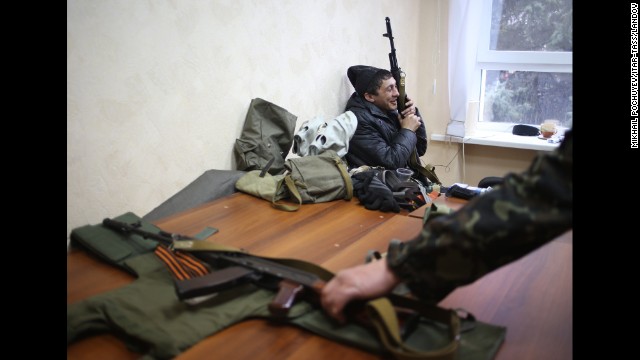 Armed pro-Russian protesters occupy the Security Service building in Luhansk on April 10.
Armed pro-Russian protesters occupy the Security Service building in Luhansk on April 10.  Members of the self-proclaimed government the "Donetsk Republic" vote April 10 during a meeting at the seized regional administration building in Donetsk.
Members of the self-proclaimed government the "Donetsk Republic" vote April 10 during a meeting at the seized regional administration building in Donetsk.  Ukrainian lawmakers from different parties scuffle during a Parliament session in Kiev on Tuesday, April 8.
Ukrainian lawmakers from different parties scuffle during a Parliament session in Kiev on Tuesday, April 8.  Workers clean up on April 8 after pro-Russian separatists and police clashed overnight in Kharkiv.
Workers clean up on April 8 after pro-Russian separatists and police clashed overnight in Kharkiv.  Pro-Russian protesters burn tires near a regional administration building in Kharkiv after police cleared the building on Monday, April 7.
Pro-Russian protesters burn tires near a regional administration building in Kharkiv after police cleared the building on Monday, April 7.  A masked man stands on top of a barricade at the regional administration building in Donetsk on April 7.
A masked man stands on top of a barricade at the regional administration building in Donetsk on April 7.  Protesters wave a Russian flag as they storm the regional administration building in Donetsk on Sunday, April 6. Protesters seized state buildings in several east Ukrainian cities, prompting accusations from Kiev that Moscow is trying to "dismember" the country.
Protesters wave a Russian flag as they storm the regional administration building in Donetsk on Sunday, April 6. Protesters seized state buildings in several east Ukrainian cities, prompting accusations from Kiev that Moscow is trying to "dismember" the country.  Pro-Russian protesters clash with police as they try to occupy a regional administration building in Donetsk on April 6.
Pro-Russian protesters clash with police as they try to occupy a regional administration building in Donetsk on April 6.  Pro-Russian activists hold a rally in front of a Ukrainian Security Service office in Luhansk on April 6.
Pro-Russian activists hold a rally in front of a Ukrainian Security Service office in Luhansk on April 6. 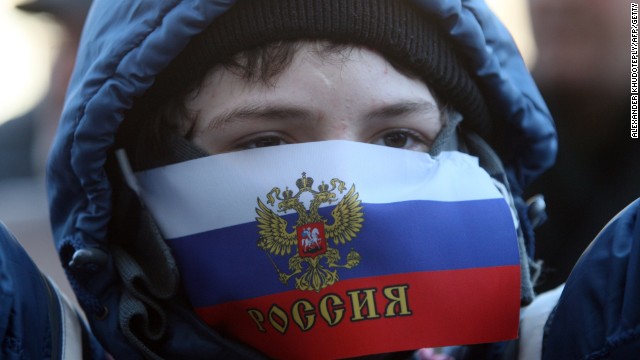 A young demonstrator with his mouth covered by a Russian flag attends a pro-Russia rally outside the regional government administration building in Donetsk on Saturday, April 5.
A young demonstrator with his mouth covered by a Russian flag attends a pro-Russia rally outside the regional government administration building in Donetsk on Saturday, April 5.  A Ukrainian soldier guards a road not far from Prokhody, a village near the Russian border, on April 5. Ukrainian and Western officials have voiced alarm about Russia's reported military buildup on Ukraine's eastern border.
A Ukrainian soldier guards a road not far from Prokhody, a village near the Russian border, on April 5. Ukrainian and Western officials have voiced alarm about Russia's reported military buildup on Ukraine's eastern border.  Ukrainian cadets at the Higher Naval School embrace a friend who has decided to stay in the school during a departure ceremony in Sevastopol, Crimea, on Friday, April 4. Some 120 cadets who refused to take Russian citizenship left the school to return to Ukraine.
Ukrainian cadets at the Higher Naval School embrace a friend who has decided to stay in the school during a departure ceremony in Sevastopol, Crimea, on Friday, April 4. Some 120 cadets who refused to take Russian citizenship left the school to return to Ukraine. 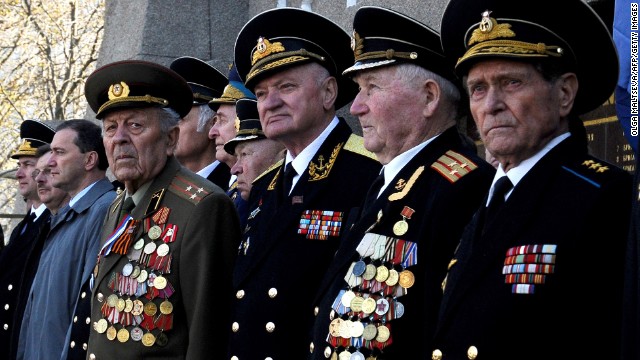 Soviet military veterans take part in a flower-laying ceremony at the Soviet-era World War II memorial in Sevastopol on Thursday, April 3.
Soviet military veterans take part in a flower-laying ceremony at the Soviet-era World War II memorial in Sevastopol on Thursday, April 3.  Ukrainian soldiers conduct a training session on the Desna military shooting range northeast of Kiev on Wednesday, April 2.
Ukrainian soldiers conduct a training session on the Desna military shooting range northeast of Kiev on Wednesday, April 2.  Russian soldiers prepare for diving training in front of a Tarantul-III class missile boat Tuesday, April 1, in Sevastopol.
Russian soldiers prepare for diving training in front of a Tarantul-III class missile boat Tuesday, April 1, in Sevastopol.  People pass by barricades near the Dnipro Hotel in Kiev on April 1.
People pass by barricades near the Dnipro Hotel in Kiev on April 1.  People walk past a train loaded with Russian tanks Monday, March 31, in the Gvardeyskoe railway station near Simferopol, Crimea.
People walk past a train loaded with Russian tanks Monday, March 31, in the Gvardeyskoe railway station near Simferopol, Crimea.  A Russian solder sits in a tank at the Ostryakovo railway station, not far from Simferopol on March 31.
A Russian solder sits in a tank at the Ostryakovo railway station, not far from Simferopol on March 31.  Russian Prime Minister Dmitry Medvedev speaks about the economic development of Crimea during a meeting March 31 in Simferopol.
Russian Prime Minister Dmitry Medvedev speaks about the economic development of Crimea during a meeting March 31 in Simferopol.  Members of the Ukrainian National Guard take part in military exercises on a shooting range near Kiev on March 31.
Members of the Ukrainian National Guard take part in military exercises on a shooting range near Kiev on March 31.  A woman cries Sunday, March 30, during a gathering to honor those who were killed during protests in Kiev's Independence Square.
A woman cries Sunday, March 30, during a gathering to honor those who were killed during protests in Kiev's Independence Square.  A woman and child walk past a line of police officers during a rally in Kharkiv on March 30.
A woman and child walk past a line of police officers during a rally in Kharkiv on March 30. 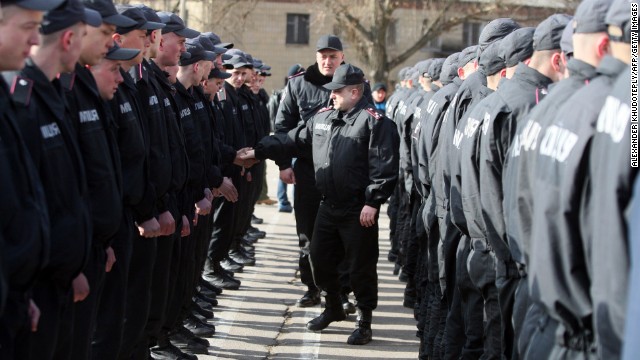 Ukrainian soldiers take part in a training exercise at a military base in Donetsk on Saturday, March 29.
Ukrainian soldiers take part in a training exercise at a military base in Donetsk on Saturday, March 29. 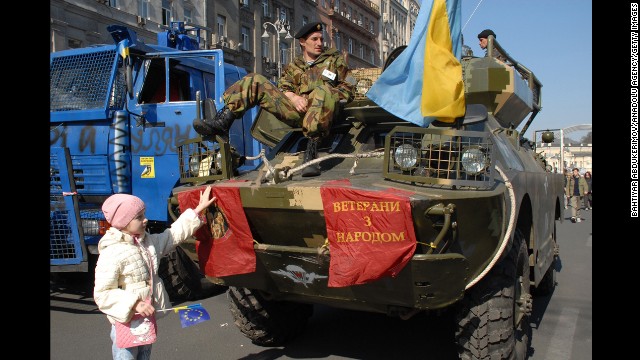 Demonstrators protest Friday, March 28, in Kiev, displaying police vehicles they seized during earlier clashes with authorities.
Demonstrators protest Friday, March 28, in Kiev, displaying police vehicles they seized during earlier clashes with authorities. 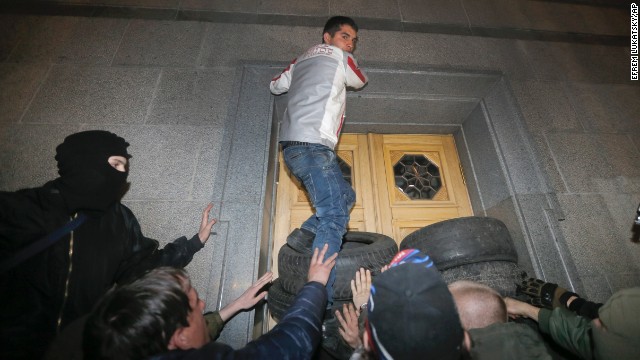 Members of the Right Sector group block the Ukrainian parliament building in Kiev on Thursday, March 27. Activists called for Interior Minister Arsen Avakov to step down after the recent killing of radical nationalist leader Oleksandr Muzychko, who died during a police operation to detain him. Muzychko and the Right Sector are credited with playing a lead role in the protests that toppled Ukrainian President Victor Yanukovych.
Members of the Right Sector group block the Ukrainian parliament building in Kiev on Thursday, March 27. Activists called for Interior Minister Arsen Avakov to step down after the recent killing of radical nationalist leader Oleksandr Muzychko, who died during a police operation to detain him. Muzychko and the Right Sector are credited with playing a lead role in the protests that toppled Ukrainian President Victor Yanukovych. 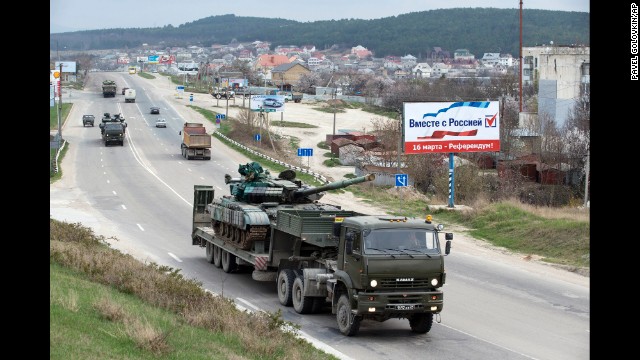 Ukrainian tanks are transported from their base in Perevalne, Crimea, on Wednesday, March 26. After Russian troops seized most of Ukraine's bases in Crimea, interim Ukrainian President Oleksandr Turchynov ordered the withdrawal of armed forces from the Black Sea peninsula, citing Russian threats to the lives of military staff and their families.
Ukrainian tanks are transported from their base in Perevalne, Crimea, on Wednesday, March 26. After Russian troops seized most of Ukraine's bases in Crimea, interim Ukrainian President Oleksandr Turchynov ordered the withdrawal of armed forces from the Black Sea peninsula, citing Russian threats to the lives of military staff and their families. 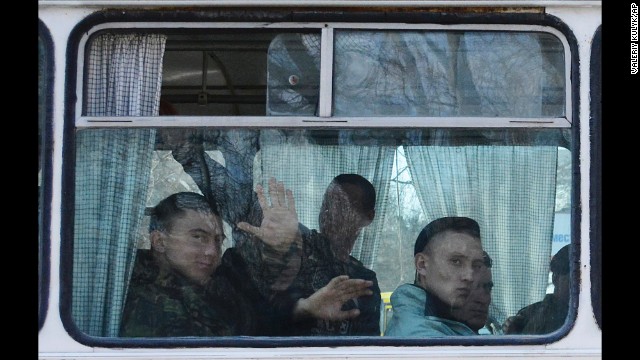 Ukrainian marines wave as they leave a base in Feodosia, Crimea, on Tuesday, March 25.
Ukrainian marines wave as they leave a base in Feodosia, Crimea, on Tuesday, March 25. 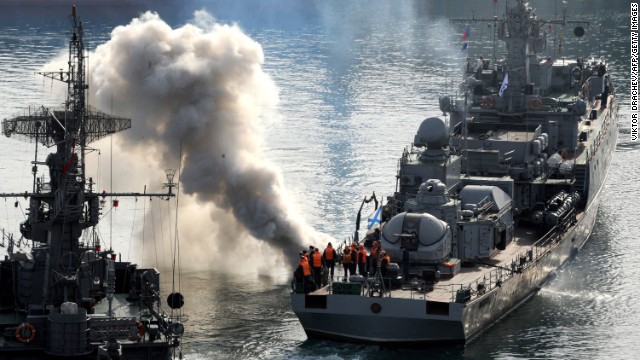 Russian sailors stand on the deck of the corvette ship Suzdalets in the bay of Sevastopol on March 25.
Russian sailors stand on the deck of the corvette ship Suzdalets in the bay of Sevastopol on March 25. 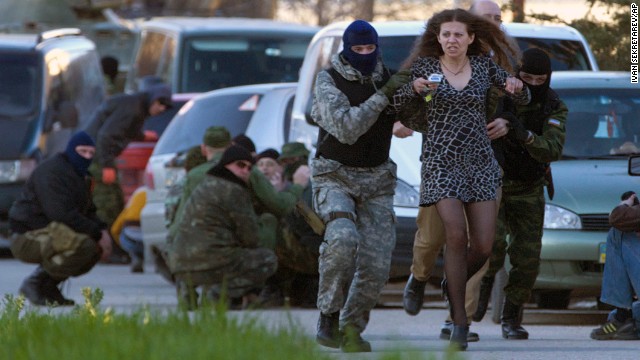 Pro-Russian militia members remove a resident as Russian troops assault the Belbek air base, outside Sevastopol, on Saturday, March 22. After its annexation of Crimea, Russian forces have consolidated their control of the region.
Pro-Russian militia members remove a resident as Russian troops assault the Belbek air base, outside Sevastopol, on Saturday, March 22. After its annexation of Crimea, Russian forces have consolidated their control of the region.  Soldiers in unmarked uniforms sit atop an armored personnel carrier at the gate of the Belbek air base on March 22.
Soldiers in unmarked uniforms sit atop an armored personnel carrier at the gate of the Belbek air base on March 22. 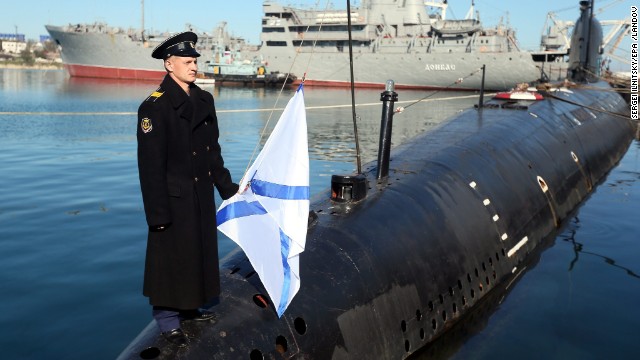 A Russian sailor holds the Russian Navy's St. Andrew's flag while standing on the bow of the surrendered Ukrainian submarine Zaporozhye on March 22 in Sevastopol.
A Russian sailor holds the Russian Navy's St. Andrew's flag while standing on the bow of the surrendered Ukrainian submarine Zaporozhye on March 22 in Sevastopol. 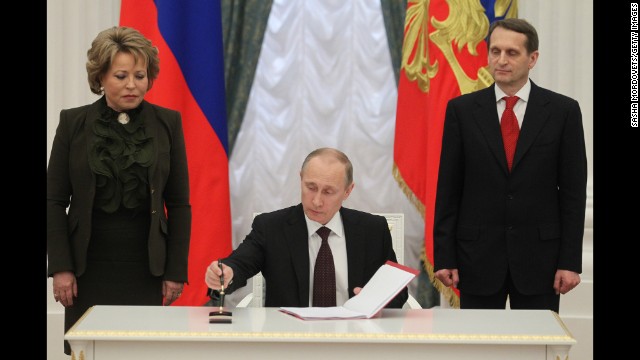 Russian President Vladimir Putin signs the final decree completing the annexation of Crimea on Friday, March 21, as Upper House Speaker Valentina Matviyenko, left, and State Duma Speaker Sergei Naryshkin watch.
Russian President Vladimir Putin signs the final decree completing the annexation of Crimea on Friday, March 21, as Upper House Speaker Valentina Matviyenko, left, and State Duma Speaker Sergei Naryshkin watch. 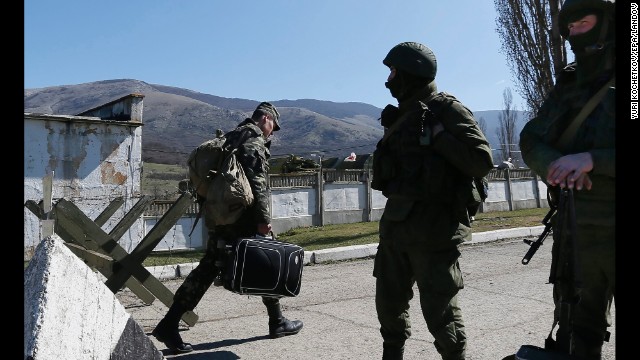 A Ukrainian serviceman leaves a Ukrainian military unit that Russian soldiers took control of in Perevalne on March 21.
A Ukrainian serviceman leaves a Ukrainian military unit that Russian soldiers took control of in Perevalne on March 21. 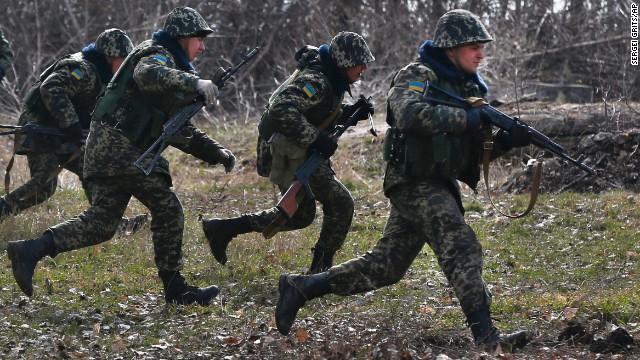 Ukrainian border guards run during training at a military camp in Alekseyevka, Ukraine, on March 21.
Ukrainian border guards run during training at a military camp in Alekseyevka, Ukraine, on March 21. 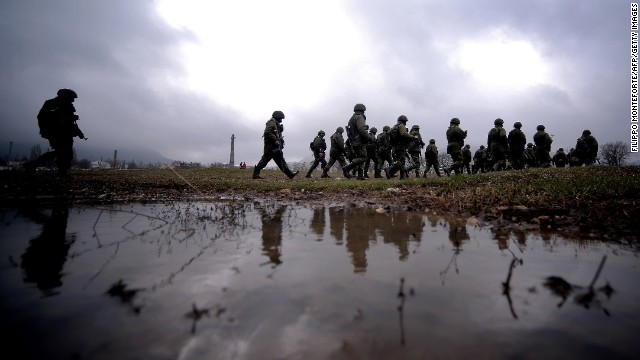 Russian soldiers patrol the area surrounding a Ukrainian military unit in Perevalne on Thursday, March 20.
Russian soldiers patrol the area surrounding a Ukrainian military unit in Perevalne on Thursday, March 20. 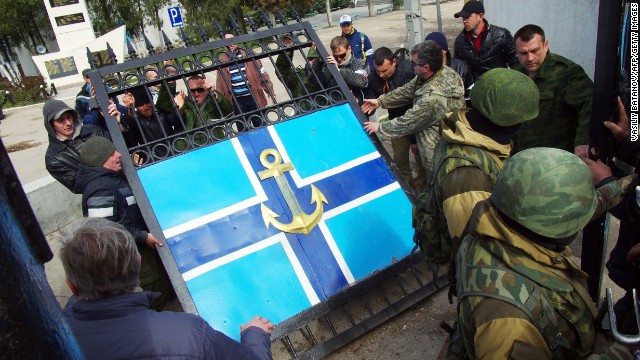 Pro-Russian protesters remove the gate to the Ukrainian navy headquarters as Russian troops stand guard in Sevastopol on Wednesday, March 19.
Pro-Russian protesters remove the gate to the Ukrainian navy headquarters as Russian troops stand guard in Sevastopol on Wednesday, March 19. 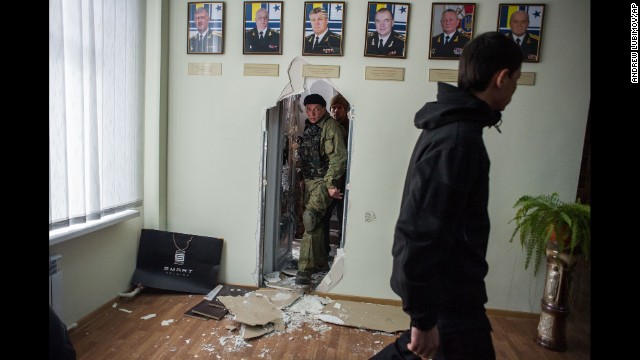 Pro-Russian forces walk inside the Ukrainian navy headquarters in Sevastopol on March 19.
Pro-Russian forces walk inside the Ukrainian navy headquarters in Sevastopol on March 19. 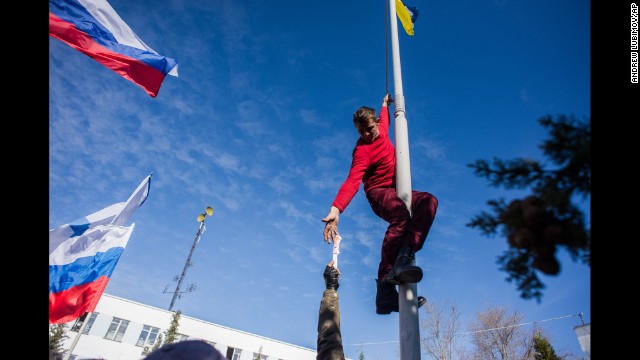 A member of pro-Russian forces takes down a Ukrainian flag at the Ukrainian navy headquarters in Sevastopol on March 19.
A member of pro-Russian forces takes down a Ukrainian flag at the Ukrainian navy headquarters in Sevastopol on March 19. 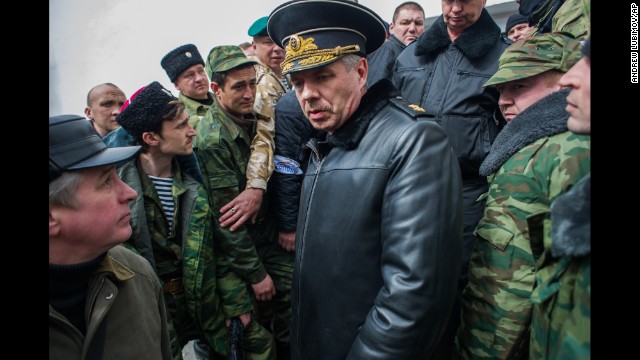 Alexander Vitko, chief of the Russian Black Sea Fleet, leaves the Ukrainian navy headquarters in Sevastopol after pro-Russian forces took it over on March 19.
Alexander Vitko, chief of the Russian Black Sea Fleet, leaves the Ukrainian navy headquarters in Sevastopol after pro-Russian forces took it over on March 19. 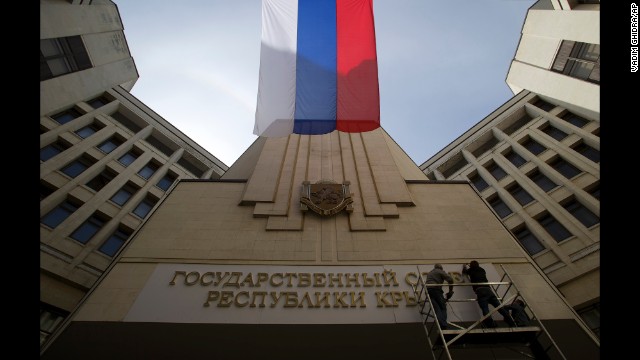 A Russian flag waves as workers install a new sign on a parliament building in Simferopol, Crimea's capital, on March 19.
A Russian flag waves as workers install a new sign on a parliament building in Simferopol, Crimea's capital, on March 19.  Russian military personnel surround a Ukrainian military base in Perevalne on March 19.
Russian military personnel surround a Ukrainian military base in Perevalne on March 19. 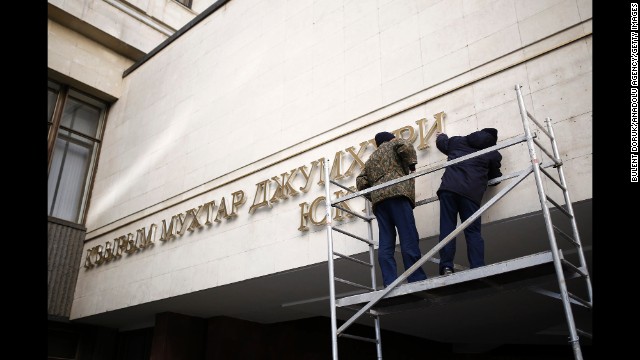 Nameplates on the front of the Crimean parliament building get removed Tuesday, March 18, in Simferopol.
Nameplates on the front of the Crimean parliament building get removed Tuesday, March 18, in Simferopol. 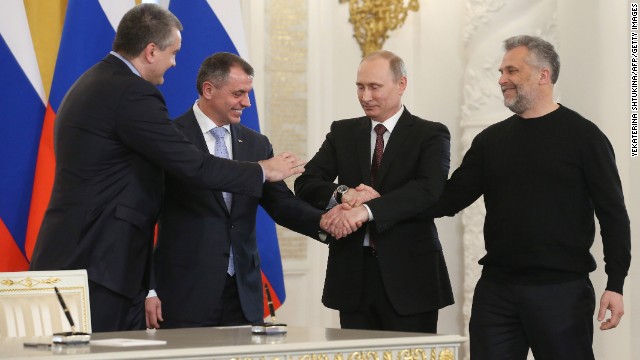 From left, Crimean Prime Minister Sergey Aksyonov; Vladimir Konstantinov, speaker of the Crimean parliament; Russian President Vladimir Putin; and Alexei Chaly, the new de facto mayor of Sevastopol, join hands in Moscow on March 18 after signing a treaty to make Crimea part of Russia.
From left, Crimean Prime Minister Sergey Aksyonov; Vladimir Konstantinov, speaker of the Crimean parliament; Russian President Vladimir Putin; and Alexei Chaly, the new de facto mayor of Sevastopol, join hands in Moscow on March 18 after signing a treaty to make Crimea part of Russia. 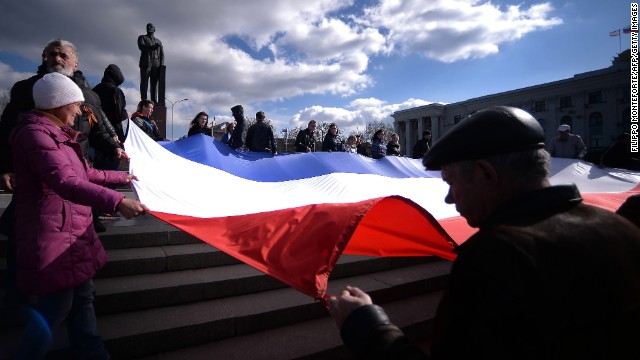 Demonstrators hold a Crimean flag at Lenin Square in Simferopol on March 18.
Demonstrators hold a Crimean flag at Lenin Square in Simferopol on March 18. 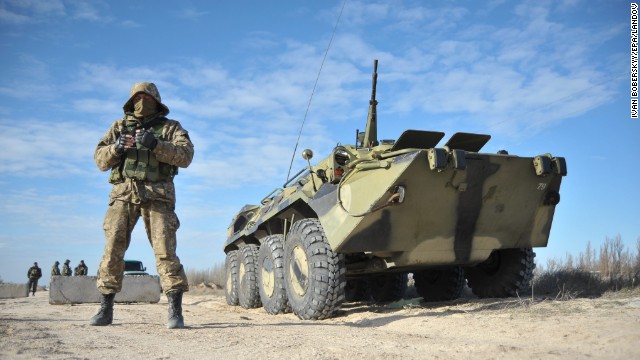 Ukrainian soldiers stand guard at a checkpoint near Strilkove, Ukraine, close to Crimea on Monday, March 17.
Ukrainian soldiers stand guard at a checkpoint near Strilkove, Ukraine, close to Crimea on Monday, March 17. 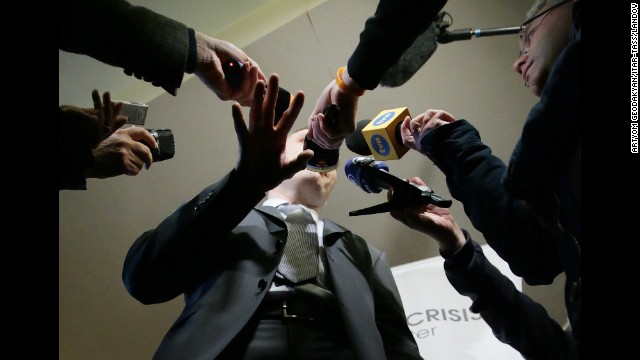 Former boxer and Ukrainian politician Vitali Klitschko addresses reporters in Kiev on March 17.
Former boxer and Ukrainian politician Vitali Klitschko addresses reporters in Kiev on March 17. 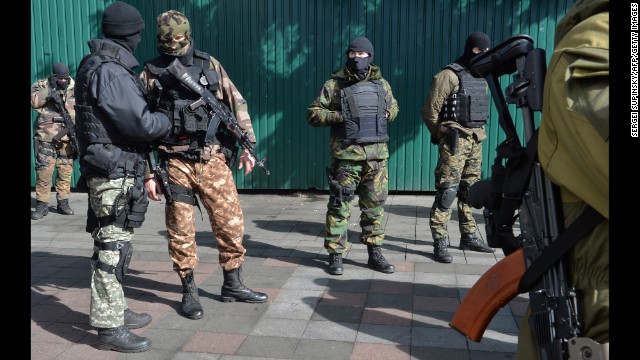 Ukrainian troops stand guard in front of the Ukrainian Parliament building in Kiev on March 17.
Ukrainian troops stand guard in front of the Ukrainian Parliament building in Kiev on March 17. 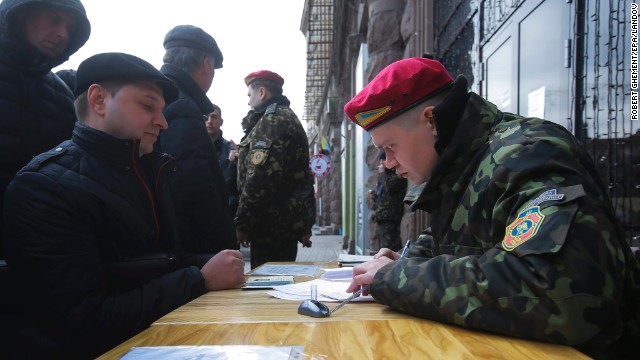 A Ukrainian man applies for the National Guard at a mobile recruitment center in Kiev on March 17.
A Ukrainian man applies for the National Guard at a mobile recruitment center in Kiev on March 17. 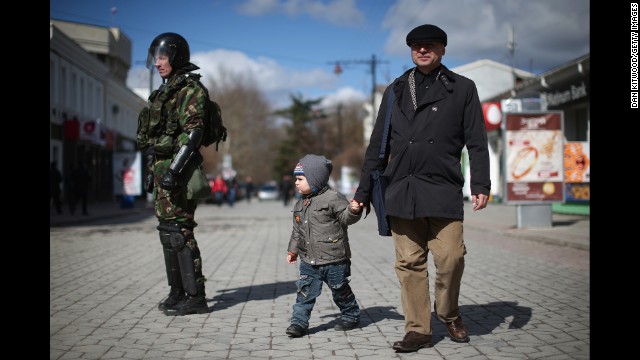 Civilians walk past riot police in Simferopol on March 17.
Civilians walk past riot police in Simferopol on March 17. 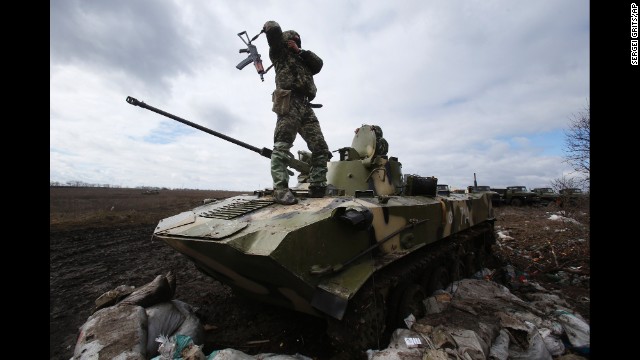 A Ukrainian soldier stands on top of an armored vehicle at a military camp near the village of Michurino, Ukraine, on March 17.
A Ukrainian soldier stands on top of an armored vehicle at a military camp near the village of Michurino, Ukraine, on March 17. 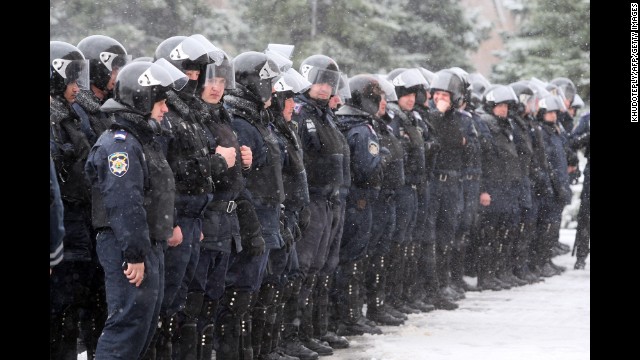 Policemen stand guard outside the regional state administration building in Donetsk during a rally by pro-Russia activists March 17.
Policemen stand guard outside the regional state administration building in Donetsk during a rally by pro-Russia activists March 17. 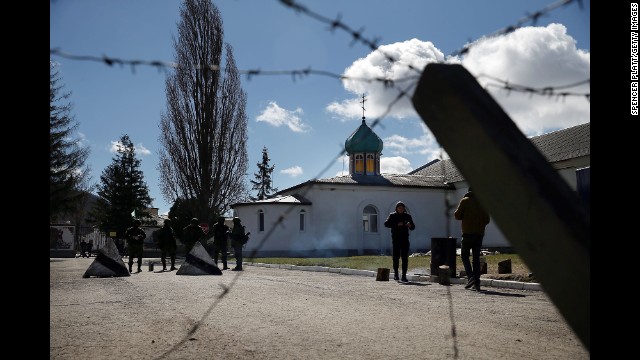 Armed soldiers stand guard outside a Ukrainian military base in Perevalne on March 17.
Armed soldiers stand guard outside a Ukrainian military base in Perevalne on March 17. 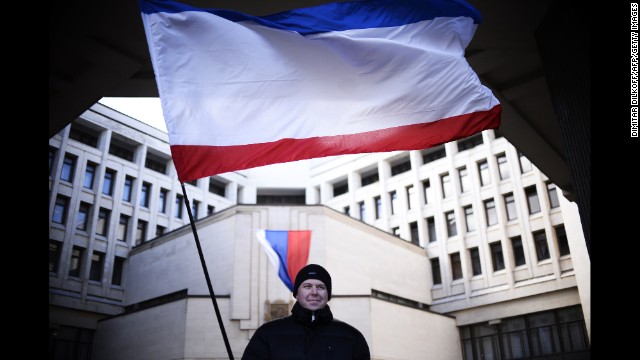 A man holds a Crimean flag as he stands in front of the Crimean parliament building in Simferopol on March 17.
A man holds a Crimean flag as he stands in front of the Crimean parliament building in Simferopol on March 17.  Crimeans holding Russian flags celebrate in front of the parliament building in Simferopol on Sunday, March 16.
Crimeans holding Russian flags celebrate in front of the parliament building in Simferopol on Sunday, March 16. 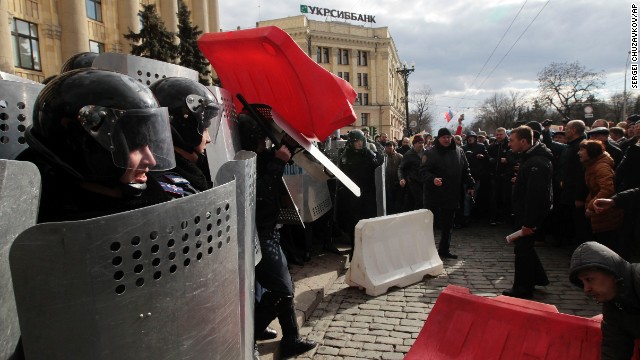 A Ukrainian police officer tries to shield himself from a road block thrown by pro-Russia supporters in Kharkiv on March 16.
A Ukrainian police officer tries to shield himself from a road block thrown by pro-Russia supporters in Kharkiv on March 16. 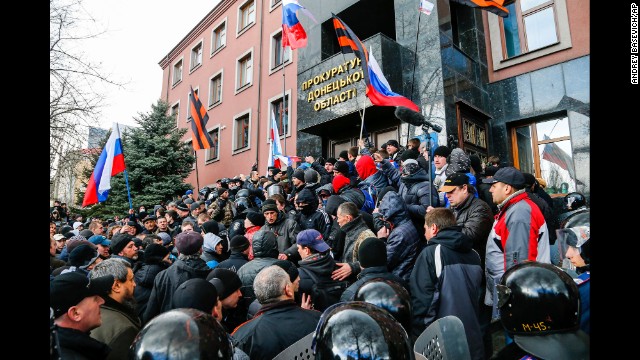 Pro-Russia demonstrators storm the prosecutor general's office during a rally in Donetsk on March 16.
Pro-Russia demonstrators storm the prosecutor general's office during a rally in Donetsk on March 16. 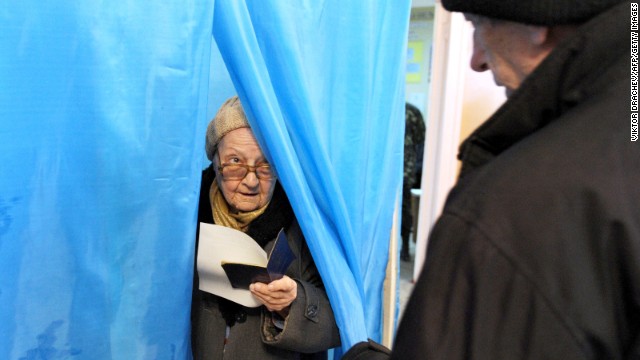 A woman leaves a voting booth in Sevastopol on March 16. See the crisis in Ukraine before Crimea voted
A woman leaves a voting booth in Sevastopol on March 16. See the crisis in Ukraine before Crimea voted
- Russia and the West locked in match of wits over eastern Ukraine
- Russia moved thousands of troops to border and is accused of stirring unrest in east Ukraine
- Speck: West must unite to pass severe sanctions on Russian regime
- Speck: Ukrainian government attempt to retake buildings could spark Russian invasion
Editor's note: Ulrich Speck is a visiting scholar at the Carnegie Europe think tank in Brussels. The opinions expressed in this commentary are solely his. Follow @uli_speck and @Carnegie_Europe on Twitter.
(CNN) -- Russia's seizure of Crimea last month may have unfolded with a lightning quickness, but Vladimir Putin and the West are now engaged in a much slower match of wits on a chessboard stretching across most of eastern Ukraine.
Rather than going for checkmate, both sides now seem content to wait for the other to make a mistake. Putin made a strong first move by placing 40,000 troops on the border -- and separatists, who are not officially linked to Russia, on the ground in Ukraine.
Now Moscow is waiting for the pro-Western government in Kiev to try to retake the parts of the east it has seemingly lost. In Russia's eyes, any such move from the capital would legitimize an overwhelming counterattack -- a re-run of the Georgia crisis in 2008, when President Mikheil Saakashvili lost his nerve, shot first, and prompted a Russian invasion.
Putin's problem is time; he cannot wait forever to strike. Troops cannot remain ready for combat for many months at a time. Separatists in eastern Ukraine are lost without outside support, and may become nervous as time drags on without any glimpse of a light at the end of the tunnel.
On the other side of the board are U.S. President Barack Obama, German Chancellor Angela Merkel and Ukraine's fledgling government. The biggest challenge for Obama and his German counterpart is to keep a united Western front. They need to uphold a credible threat of massive economic sanctions that could undercut the Kremlin's funding if it doesn't toe the line.
But cracks in Western unity are visible everywhere. Europe may be concerned about Russian aggression in Ukraine, but the continent is dragging its collective feet on taking a more confrontational stance towards Putin.
 Observers detained in eastern Ukraine
Observers detained in eastern Ukraine  Living on the edge in eastern Ukraine
Living on the edge in eastern Ukraine  What is Putin's interest in Ukraine?
What is Putin's interest in Ukraine?  Ukraine crisis hurting Russia's economy
Ukraine crisis hurting Russia's economy Some nations fear Russian pressure, especially on their energy supply. Many are nervous about the price their own countries will pay as a result of tougher sanctions. And nobody is sure yet whether they're ready to abandon the idea of Russia as a vital partner.
Obama, on the other hand, is much more inclined to put the squeeze on the Kremlin. Washington is used to confrontation with Russia -- and with Putin, specifically -- and America is much less economically-connected with its old Cold War rival.
American leaders aren't motivated solely by their concern over eastern Europe and Russia reasserting itself as a more aggressive and expansionist power. The U.S. also wants to assert key norms of international order -- namely territorial integrity and the principle to change borders only with the consent of all parties.
Ukraine is also a welcome opportunity to signal to allies and rivals alike that America is not retrenching from its global engagements. The impact of the Ukraine crisis on China and the various territorial conflicts with its neighbors will also loom very large on the minds of policy makers in Washington.
But whatever the differences among U.S. and EU leaders, the more they act in concert, the better chance they have to achieve their goal: beating back Moscow's attempt to undermine Ukraine's sovereignty and territorial integrity.
The West also needs to make sure that Kiev's interim government doesn't lose its nerve. As hard as it is for leaders to watch pro-Russian separatists take over their buildings, any large-scale operation in eastern Ukraine could give Putin the opportunity he may be waiting for: invasion with some kind of dubious pseudo-legal cover.
It is difficult to say who is in a better position. Putin is a master tactician. Since his years as a KGB agent in Dresden in the 1980s, he has gained much expertise in finding and exploiting the West's weak spots. And he seems to have broad support at home for his confrontational brand of politics.
Putin's weakness is his regime's economic dependency on the West. Without the steady flow of income from the sale of gas and oil, brought under control of the Kremlin, the regime would not be able to buy support at home and to finance costly and risky foreign policy adventures.
The West has no appetite to confront Russia. But if Putin's tanks roll into eastern Ukraine out of the blue, without any pretense of legitimacy, he will turn Western opinion even further against him. This could give Merkel and Obama the necessary backing for tough sanctions.
If he is to achieve his main goal, which is to prevent Ukraine from associating closer with the West, Putin will have to move fast. He probably needs to have some kind of Russian presence inside Ukraine (apart from Crimea), as control over separatists in the east alone might not be sufficient or sustainable.
A full-scale crackdown by the Ukrainian government on separatists would give Moscow the cover to move some Russian troops as "peacekeepers" into eastern Ukraine. Once inside the country, another "frozen conflict" could be created which would destabilize the country and prevent Western attempts to help Ukraine to get on its feet. This would keep Putin's longer-term ambition -- to bring Ukraine into a Moscow-led alliance or federation -- very much alive.
If the Kremlin comes to the conclusion that the West wouldn't respond to such a move with painful sanctions -- ones that would damage Putin's inner circle and be strong enough to sap major sources of income for the Kremlin -- Putin might choose to move along such lines or in other ways.
But if the U.S. and EU demonstrate that they are truly ready to use economic warfare to counter the Russian military machine, the West may yet be able to deter Putin from going much further. Something has to give soon.
READ MORE: Ukrainian mayor shot as West prepares sanctions
READ MORE: Five ways the Ukraine crisis could end
The opinions expressed in this commentary are solely those of Ulrich Speck.
No comments:
Post a Comment